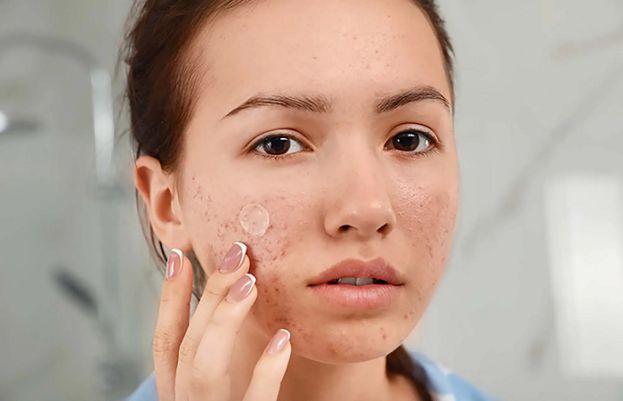
The bad news is that some acne products can cause side effects like redness, discoloration, or dryness.[1] For this reason, some people prefer soothing acne at home with natural solutions.
Typically, the more mild the acne, the more easily it can be treated at home, says Joshua Zeichner, MD, director of cosmetic and clinical research in dermatology at Mount Sinai Hospital in New York City. In more severe cases, though — especially if there are cysts or nodules — professional treatments often are necessary.
For mild acne, you might be surprised to learn that you already have several acne-soothing remedies in your own home — and in your kitchen of all places.
You can mix common foods and ingredients, such as cucumbers, oatmeal, grapes, and yeast, into a facial mask for some acne self-care. A homemade facial may help calm or soothe acne, as well as keep your skin glowing, moisturized, and healthy.
1. Grape Cleanser
Grapes are a refreshing snack, whether eaten plain as a snack, halved as a salad topping, or frozen as a healthy dessert. But grapes likely don’t come to mind when you think of acne treatments.
Yet according to a review article, resveratrol in the skin of red grapes may exhibit bactericidal activity against Cutibacterium acnes. Formerly called Propionibacterium acnes, C. acnes is a bacteria in the sebaceous glands that contributes to acne.[2]
So grab a few fresh grapes from your fridge, and you’ve got an easy facial cleanser. Cut two or three grapes in half and rub the flesh over your face and neck, says Fran E. Cook-Bolden, MD, a dermatologist in New York City. Follow with a cool water rinse.
2. Cucumber Facemask
If you’ve ever been to a spa, you’ve likely put cucumber slices on your eyes to reduce puffiness — and they may not be a sham treatment.
One review suggested that cucumbers can have a soothing effect on the skin, reducing irritation, swelling, and pain.[3] Hence, they can potentially relieve inflammation specifically associated with acne.
In the case of acne, “inflammation develops within the oil gland and follicle, leading to red, angry bumps in the skin,” says Dr. Zeichner. When acne develops deep within the skin, “a cyst may develop and become filled with oil. If the cyst wall ruptures and the oil becomes exposed to the deeper skin layers, a robust inflammatory reaction often occurs,” he says.
How can cucumbers help?
“Cucumbers have skin soothing and hydrating benefits, so if your skin is inflamed from acne, cucumbers may offer a modest calming benefit,” notes Zeichner. But he warns that they’re not effective at treating the underlying pimples.
Here’s how to reap the benefits: “Make a paste by blending one small cucumber and 1 cup of oatmeal,” says Dr. Cook-Bolden. Mix 1 teaspoon (tsp) of this paste with 1 tsp of plain yogurt and apply it to your face. Leave it on for 30 minutes, and then rinse.
3. Cucumber Face Pack
If you don’t have oatmeal or yogurt in your kitchen, use this cucumber remedy instead. This cooling, soothing mask will help smooth your skin, which can feel rough from acne. “Mash one whole cucumber, strain the water, add 1 tablespoon of sugar, and mix well,” says Cook-Bolden. “Apply to your face and leave it on for 10 minutes; then wash with cold water.”
4. Simple Honey Mask
Honey has many healing properties. According to the Mayo Clinic, some people use it as a natural cough syrup and to relieve a sore throat.[4]
Laboratory studies suggest that the antibacterial properties of honey may also promote the healing of burns and wound infections and inhibit the growth of C. acnes.[5]
Before applying this mask, rinse your face with warm water, says Cook-Bolden. Then apply the honey and leave it on the skin for 30 minutes. Rinse the honey off with warm water.
5. Yeast and Yogurt Mask for Oily Skin
Although more research is needed, one review article suggested that fermented dairy products like yogurt may promote skin health. Yogurt is also a probiotic, which has been shown to inhibit C. acnes.[6]
To make the mask, combine 1 tsp of brewer’s yeast with a little plain yogurt to create a thin mixture. “Apply it thoroughly to all the oily areas and leave on for 15 to 20 minutes. Rinse with warm water; then use cold water to close the pores,” Cook-Bolden says.
6. Oatmeal Facial
The anti-inflammatory properties of oatmeal are naturally soothing and may relieve irritation caused by dermatological conditions like rashes, erythema, burns, itch, and eczema, according to research.[7]
Oatmeal has skin-protecting, hydrating, and anti-inflammatory benefits, says Zeichner. “It’s not specifically effective in treating acne, but it can help soothe dry, inflamed skin. I commonly recommend oat-based moisturizers for my patients who use potentially irritating acne treatments,” he adds.
Mix together 2 tsp of oatmeal, 1 tsp of baking soda, and enough water to form a paste. Smooth the paste all over your face and very gently rub it in. Make sure not to over-exfoliate. Rinse thoroughly afterward.
7. Turmeric Facial Mask
For beautiful skin, brides in India traditionally use a turmeric mask before their wedding, says Cook-Bolden. This is likely due to the spice’s anti-inflammatory, antimicrobial, and antioxidant properties, and its ability to significantly improve the severity of skin conditions like acne, alopecia, atopic dermatitis, oral lichen planus, pruritus, and psoriasis, according to research.[8]
Ingredients for this acne remedy are available at spice markets and ethnic food stores.
Mix ½ cup of chickpea flour and 2 tsp each of turmeric powder, sandalwood powder, and ghee (clarified butter) or almond oil, and then combine them with enough water to make a paste. “Apply and leave on for 5 to 10 minutes,” says Cook-Bolden. “Rub with pressure with both palms and fingers to remove all the paste.” Rinse well with water. Be sure not to leave turmeric on the skin for too long as it can stain your skin yellow.
Are There Any Risks of DIY Skin Care?
While many at-home skin-care ingredients are ineffective but benign, a number of ingredients in popular DIY treatments can irritate or harm your skin. This is especially true if you have sensitive skin or are prone to food allergies.
Acidic ingredients like vinegars, lemon juice, and other fruit juices are often included in “brightening” treatments, but they can actually burn your skin, leading to blisters, hyperpigmentation, and discoloration. You may also have seen recipes for egg white facemasks meant to “tighten” your pores, but handling or applying raw egg to the skin may lead to a salmonella infection, which can be serious.[9] Also be careful using DIY exfoliants like baking soda, sugar, salt, and oats. The skin on your face is very delicate, and these abrasive ingredients can leave your skin raw or create microtears in the skin, possibly leading to acne.[10]
A Final Word on Home Remedies for Acne
Some homemade facial masks may help soothe acne with common ingredients found in your pantry and refrigerator. Try one or more of these remedies to calm pimple-prone skin and see how your skin responds.
But remember that at-home treatments are meant to complement, not replace, acne treatment by a dermatologist. “Delays in treatment increase the risk of developing stains in the skin or, in some cases, permanent scars,” says Zeichner.
There are many research-backed options for prescription or over-the-counter acne treatments that are more effective and, if used correctly, safer than what you can concoct at home.











